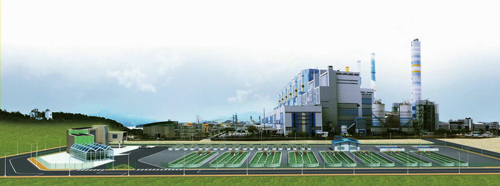
The High-tech Algae Center at the Hadong Thermal Power Complex in November 2011 as a test-bed to produce
value-added items, including bio-oil, cosmetics, and medicines, by incubating algae feeding on CO2. (photo : KOSPO)
Korea Southern Power Co. (KOSPO) was presented with the Prime Minister’s Prize of the 2013 Global Green Management Excellence Awards for spearheading responses to climate change through the development of low-carbon and green technology.
KOSPO’s low-carbon energy business portfolios bifurcate CO2 reduction and wind power projects.
In particular, the carbon capture and reuse (CCR) technology business KOSPO is implementing as a strategic one is a valued added business related to the blocking of CO2 emissions and the reutilization of CO2 as an energy resource.
In 2001, KOSPO launched a project to develop a post-combustion carbon capture technology by dry sorbent in cooperation with the Korea Institute of Energy Research (KIER) and the KEPCO Research Institute. The 0.5MW-class Hadong Thermal Power Plant No. 3 was dedicated in March 2010 as a pilot facility to experiment with the homegrown technology, the world’s first. The pilot project has proven the proprietary technology capable of capturing up to 85 percent of CO2 emissions.
KOSPO is building a 10MW-class plant, 1/50 of the 500MW Korean thermal power standard, as a facility to verify the homegrown carbon capture technology. The construction process of the plant, to be dedicated this September, is 90 percent complete. The power company plans to optimize the homegrown technology and commercialize the related operation technology by operating the verification plant. KOSPO will install and operate a 300MW-class thermal power plant using the homegrown carbon capture technology in 2015. KOSPO’s move is most likely to serve as an opportunity for the power company to get a jump-start in the global carbon capture market. It is part of the government’s roadmap for national carbon capture & storage, established in 2010 to meet national carbon reduction goals.
KOSPO is participating in a global race to seize hegemony over the CO2 treatment technology market.
For instance, KOSPO has already built the High-tech Algae Center at the Hadong Thermal Power Complex in November 2011 as a test-bed to produce value-added items, including bio-oil, cosmetics, and medicines, by incubating algae feeding on CO2. The project has led to the application for 11 intellectual property rights patents, the development of functional cosmetics, and the establishment of a bio-diesel production process. KOSPO is participating in a state-funded national task of commercializing bio-diesel using algae with the Korea Institute of Science and Technology, the Korea Research Institute of Bioscience and Biotechnology, and KIER. The power company has already developed a technology to produce eco-construction materials using fly ash and CO2, byproducts of thermal power plants, in cooperation with Gyeonggi University in 2011. KOSPO, which has established master plans for the implementation of projects at the Hadong and Samcheok Thermal Power Complexes, is now installing a 400,000-ton production facility.
KOSPO, which has accumulated expertise and experiences in the course of constructing and operating the 21MW-class Hangyeong Wind Power Plant, has teamed up with Korean wind power equipment makers to build homegrown key infrastructure for generating wind power across the nation. Under a joint plan to build 100 homegrown wind power plants, the Taebaek Wind Power Plant with a capacity of 18MW made its debut as the first homegrown wind power facility in May 2012, and the second one, capable of producing 16MW, was dedicated in November 2012, thus building a platform to make inroads into the overseas wind power market.
The power company has proactively been striving to establish a companywide green management infrastructure to cope with global warning and climate change. To name a few of its efforts, KOSPO has invested 152 billion won since 2011 to improve the efficient utilization of limited energy resources. The power company has replaced lights and turbines with LEDs and high-efficient natural gas turbines, respectively. On top of power improvement steps, KOSPO has staged companywide campaigns to enhance awareness of energy conservation. These efforts have paid off: reducing 96,217 TOE (tonnes of oil equivalent) of energy and 649,197 tonnes of CO2 in greenhouse gas emissions for the past three years. KOSPO has been recognized as a global example of mitigating greenhouse gas emissions to cope with climate change, as the company became the first business concern among Korean power and construction companies to be certified with a green management system and an environment management system in 2012, as well as a Carbon Trust Standard certification.
